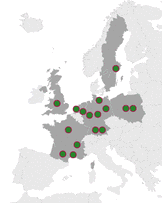WP06 - Dissemination and communication with the public
Objectives
WP6 ensures dissemination of the study results and, whenever relevant, information on consequent adjustments of clinical guidelines to various parties. These include health care providers, patients, educational institutions and the general public. Moreover, WP6 intends to enhance knowledge on novel gender concepts and DSD in the EU community to improve acceptance, decrease stigmatization and enhance empowerment of individuals with DSD.
Work Package Description
Many important clinical decisions (e.g. sex assignment at birth, timing of genital surgery) have a major impact on patients’ HRQOL, but many are currently hardly or not evidence-based. Health care providers are often not familiar with DSD conditions, and are unable to inform their patients properly about their DSD. Individuals with DSD often are ignorant about their condition or have wrong ideas about phenomena that might or might not be related to their DSD. Moreover, DSD is unknown to the majority of the community and individuals with DSD may be afflicted by stigma. DSD are different from other chronic diseases with physical disabilities, as the elementary areas of gender and psychosexuality of a persons’ identity are implied. For this reason, correct information of the general public about gender and DSD is needed.
Tasks to be accomplished in this Workpackage
Task 1: Dissemination of a corporate project identity (e.g. Logo and Website)
The website will disseminate any information that is relevant for the public and it will be updated regularly. Besides news on the whole project, all products (e.g. presentations and scientific publications) will be published on the website. Products and activities should clearly be recognized as part of the roject. Additionally, other regular dissemination activities will be planned: e.g. press releases, project flyers, interviews etc.
Task 2: Contact and information of support groups
The national coordinators will initiate and implement contacts and communication with local support support groups Subsequently, the national coordinators will inform the support groups about the study results and the evidence-based guidelines. The consortium will work closely with the support groups in development of brochures and curricula on gender and DSD.
Task 3: Information of families having a child with DSD
Information brochures for parents having a child with DSD, and children and adolescents with DSD will be developed and provided. The brochures will be translated in the different national languages, but also in e.g. Turkish, Arabic and Farsi.
Task 4: Information of health care providers
The national coordinators are also in charge of communication with general health care professionals. Teaching on the biology of DSD is already included in academic curricula of medicine, but a more holistic approach including also the non-biological and non-medical factors is needed and will be provided.. Clinical guidelines will be disseminated to societies of the different health care professionals and through the website. Furthermore, information brochures on gender and DSD will be developed and made available to general health care professionals in the national language.
Task 5: Information of the general public
All information about the study will be communicated through the press offices of the participating institutions and the DSD-Life website will be promoted for further information. Moreover, the information on the study will be communicated to the EU community through publication in e.g. health, parents’, youth, women’s, men’s and psychology magazines.


